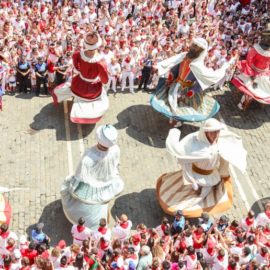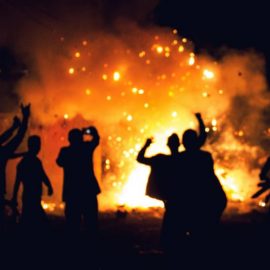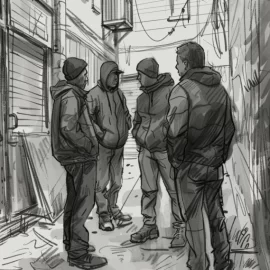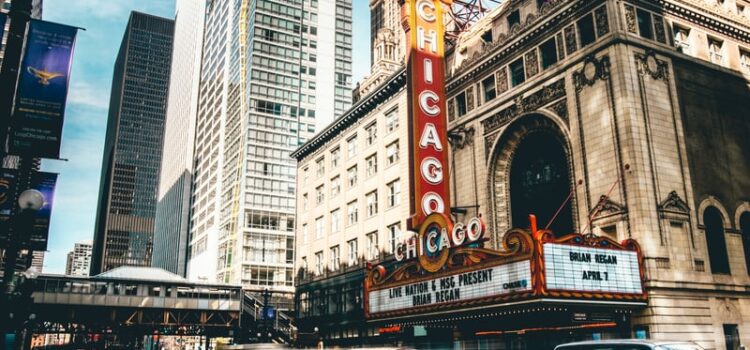
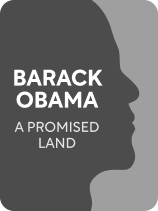
This article is an excerpt from the Shortform book guide to "A Promised Land" by Barack Obama. Shortform has the world's best summaries and analyses of books you should be reading.
Like this article? Sign up for a free trial here .
What was Barack Obama’s job in Chicago? How did community organizing propel him toward law school?
After graduating from Columbia, Barack Obama moved to Chicago. He helped local residents and eventually worked on a mayoral campaign. For Barack Obama, Chicago was a huge turning point in his career goals.
Keep reading to find out more about Barack Obama’s transformative experiences in Chicago.
Barack Obama, Chicago, 1983: Community Organizing, Community Empowerment
After graduating from Columbia in 1983, Barack wanted to put his ideals into action—to be a part of something that empowered ordinary Americans to force the country to live up to its promise. In 1983, he took a job as a community organizer with a group that was working to help inner-city Chicago residents cope with the economic and social challenges presented by rapid and widespread deindustrialization.
This was a pivotal experience for Barack. For the first time, he was working with real people and learning the nuts-and-bolts of how change was actually made at the most grassroots level. As an organizer, Barack worked with mostly (although by no means exclusively) Black Chicagoans to help them pressure the city government to allocate much-needed resources and services, including installation of stop signs and asbestos removal, to underserved communities.
This was putting Barack’s highest ideals into action—ordinary people coming together and using the democratic process to fight for meaningful improvements in their daily lives. He saw that people did have the power to hold political leaders to account, even in a city like Chicago, whose political establishment had notoriously paid little attention to the health, housing, and educational needs of its Black residents.
In working with members of the community, Barack learned to listen rather than talk, helping him step away from the insular, brooding, and self-serious young man he’d been back in New York. Hearing their stories gave him perspective—as well as some much-needed humility.
The Harold Washington Campaign: A Political Education
Despite witnessing firsthand the efficacy of grassroots democratic activism, Barack still had a distaste for electoral politics. He broadly shared his mother’s view that politicians were venal, transactional figures motivated more by power and money than by ideals or public service. Seeing how the entrenched, white political establishment in Chicago continually ignored the needs of its minority communities certainly didn’t do anything to shake this last vestige of his youthful cynicism. But Barack Obama’s time in Chicago would change that.
But his attitude toward the electoral process began to change when he saw the success of the mayoral campaign of Harold Washington (1922-1987). Washington was a U.S. Representative representing a district on the South Side of Chicago. In his 1983 mayoral campaign, he took on the city’s political machine, dominated by the powerful Daley political family.
Barack saw that what Washington had built was more than just a typical municipal election campaign. It was a movement that inspired a multiracial, multiethnic coalition of working people. The volunteers who packed Washington’s campaign offices had never participated in a campaign before, but they were moved by the possibility of electing the first Black mayor in a city that had long been scarred by racism and the resulting de facto segregation and economic inequality.
Washington shocked the political world when he beat the Daley machine to win the election. The victory and the movement that had inspired it were a revelation for Barack. He saw that a people-powered movement choosing to engage in electoral politics wasn’t “selling out” or giving in to the establishment. Rather, running progressive candidates and using the power of government to meaningfully improve people’s lives was a crucial part of effecting change. Barack Obama’s time in Chicago was shaped by this campaign.
But as stirring as the Washington campaign had been, the experience of governing was another matter altogether. Barack watched with dismay as the entrenched Chicago Democratic establishment used its control of the city’s board of aldermen (drawn from racially gerrymandered districts created to dilute the voting power of the city’s minorities) to block many of Washington’s initiatives for racial justice and poverty reduction.
Washington was certainly a charismatic leader and had succeeded in getting long-disengaged communities involved in the political process. But he hadn’t succeeded in building lasting institutions, structures, and organizations that could bring about real change over the long term.
Although he did manage to reduce the influence of patronage within the city’s civil service and help to ensure that municipal services were spread on a more equitable basis across the city, his political movement proved to be fleeting and temporary. Ultimately, it disintegrated after his death from a heart attack in 1987.
Still, Barack saw that meaningful change could come—and often needed to come—from inside the system. Seeing the successes and failures of Harold Washington’s movement helped convince Barack that someday he might do it better. Although the opportunity didn’t exist yet, Barack now knew that he wanted to run for public office. For Barack Obama, Chicago changed everything.

———End of Preview———
Like what you just read? Read the rest of the world's best book summary and analysis of Barack Obama's "A Promised Land" at Shortform .
Here's what you'll find in our full A Promised Land summary :
- How Barack Obama went from relative obscurity to the first Black president
- What principles guided his political leadership style
- Why Obama retained an unshakable faith in the potential and promise of America

